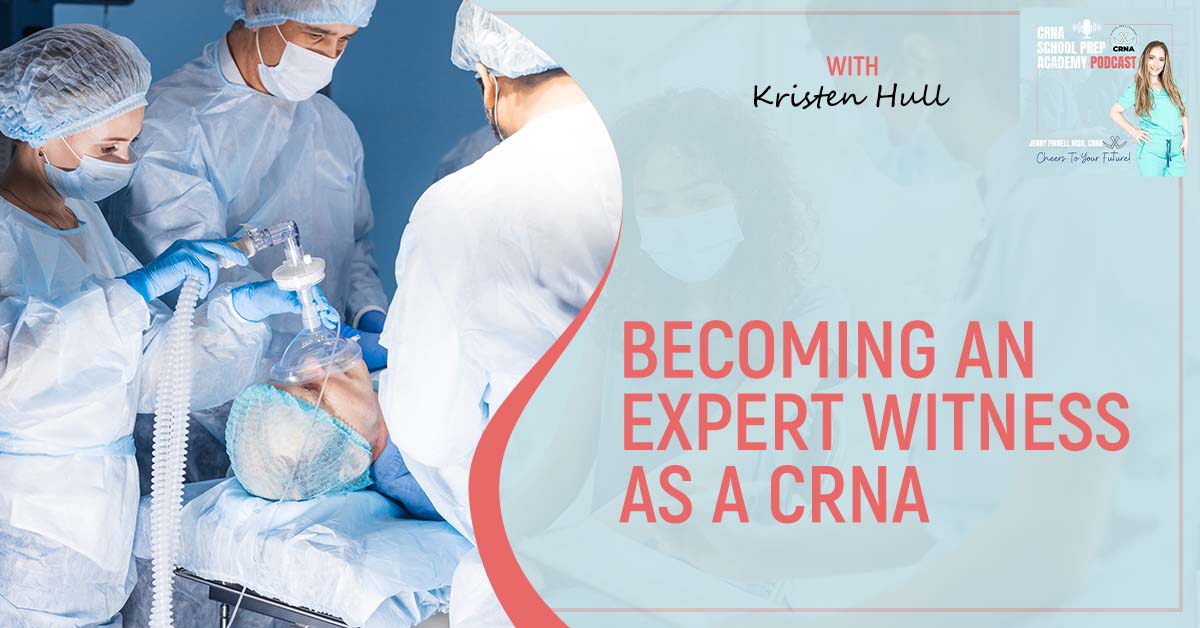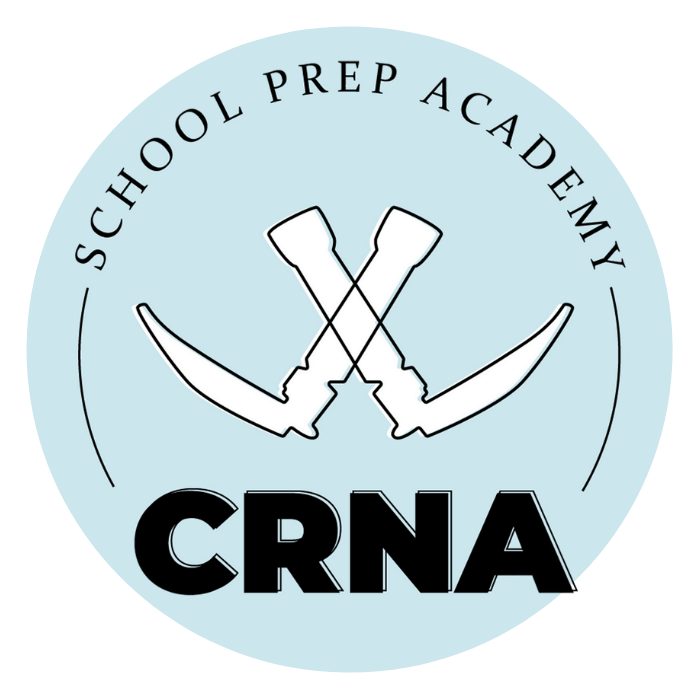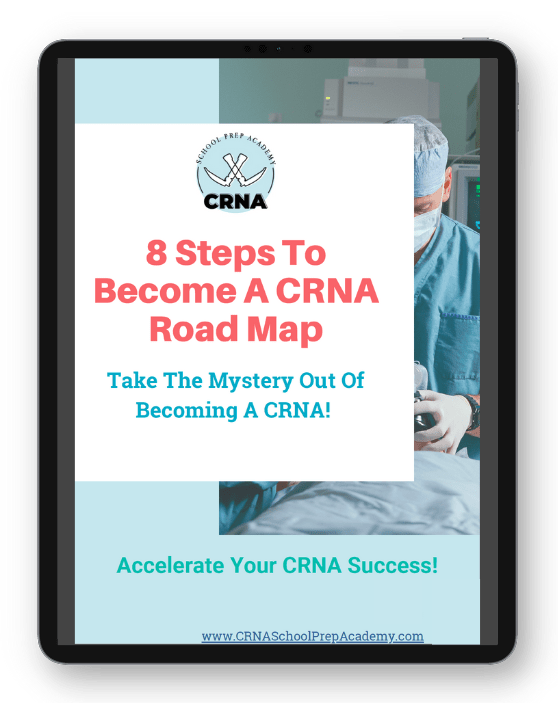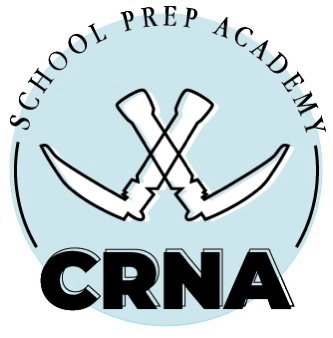
As a CRNA, being an expert witness is not only a rewarding career, but it also allows you to make a significant impact in the legal system. In this episode, Kristen Hull explores the fascinating world of becoming an expert witness as a CRNA. Our host Jenny Finnell had the pleasure of meeting Kristen on LinkedIn and was intrigued by her work as an expert witness. That’s why today, they discuss what it takes to become an expert witness, how to get started, and why it could be an exciting career path for CRNAs. Whether you’re a seasoned professional or a CRNA student, you’ll gain valuable insights and advice from Kristen’s firsthand experience. Tune in and learn how to become an expert witness as a CRNA.
Get access to planning tools, mock interviews, valuable CRNA Faculty guidance, and mapped-out courses that have been proven to accelerate your CRNA success! Become a member of CRNA School Prep Academy here!
https://www.crnaschoolprepacademy.com/join
Book a mock interview, personal statement critique, resume review and more at https://www.TeachRN.com
Join the CSPA email list here! https://www.cspaedu.com/podcast-email
Send Jenny an email or make a podcast request!
Hello@CRNASchoolPrepAcademy.com
Curious to learn more about being an expert witness as a CRNA? Book a mentor session with Kristen through Nurses Teach Nurses! https://app.nursesteachnurses.com/services/197
—
Watch the episode here
Listen to the podcast here
Becoming An Expert Witness As A CRNA With Kristen Hull
In this episode, we have a very special guest, Kristen Hull. Welcome, Kristen.
Thanks for having me.
Thank you for being here. We’re going to discuss whether a CRNA can become an expert witness. If so, how do you become an expert witness as a CRNA, and why this may be of interest to you. I am so fortunate to have met Kristen on LinkedIn. I’ve known of expert witnesses and I know CRNAs can do this type of work, but I’ve never had the pleasure of speaking with someone to hear more about what it is like. We met and we discussed this. I thought this would be an interesting topic.
It just so happened that when I went to a recent faculty meeting and met one of our CRNA School Prep Academy students, Brittany, she asked me about this career path. I’m like, “I think I have an idea of whom we can talk to learn more about it because I don’t know enough to speak to it.” This was meant to be that you came to my world. This is amazing. Welcome to the show. I’m so excited to have you. Let’s share with everyone a little bit about your CRNA background and how you got into being an expert witness.
I’ve been a nurse for fifteen years. I knew from the time I was ten years old that I wanted to be a CRNA. I had a little soccer accident, had surgery on my ankle, and I absolutely loved my CRNA. When I was in high school, I knew I was going to a four-year program where I was going to get my Bachelor’s. I was going to work for a couple of years and go straight into CRNA school, which is essentially what I did.
I have been practicing for about fifteen years. My CRNA career got to the point where I reached the top. I was doing all the cases that I loved. I was a charge nurse sometimes. I was teaching students. I got to the point where I’m like, “What’s next?” I worked my entire career to get to this point. I had a couple of children. I was missing all the important stuff that was going on in their lives. I wasn’t getting out on time or I was always busy. I was doing a deep dive like, “What’s next?”
I had a bad experience when my son was born, and that put me in contact with a risk manager. It was interesting because I just wanted to share my whole story about, “This is how I felt when I was in the hospital” or “These were the things that happened that shouldn’t have happened.” She didn’t listen to much of what I was saying and I felt so frustrated.
I was like, “I wonder who really is reviewing this stuff? Is she reviewing the record?” That sent me onto my journey of, “This is going to be a thing where I can do what I love, which is anesthesia. I also can do a new career path where I can help people have a voice when they need it.” That merged both worlds. I didn’t know what that looked like at first.
What Is A CRNA Expert Witness?
I started doing some online courses. I started watching a lot of YouTube videos. I was like, “Expert witness,” but I didn’t realize all the different levels of what you could be doing. I started my own business. I started reaching out to attorneys, “What does this look like? What are the needs here? Are there a lot of anesthesia errors?”
I did a ton of marketing, I did a ton of educating. What I’ve learned is that you can help in two ways. You can solely be behind the scenes where you’re not listed on a lawsuit. An attorney can say, “Here are some medical records. This is what happened to this patient.” You can talk to the attorney similar to how you’re educating an SRNA, “This is what happened in this case. This is what should have happened in this case. This is what we do.” You can write a report based solely on your thoughts that are never going to be shared with anyone else.
The other side of it is being an expert witness where you are critiquing or standing up to what is done in normal practice like esophageal intubation. A patient had esophageal intubation and it wasn’t identified on induction, the case started, and the patient suffered an anoxic brain injury. You would say, “What we typically do is we listen for breath sounds and we monitor end tidal CO2. It’s okay if esophageal intubation happens, but we have to correct it before it’s too late.”
You build your story of what you’re going to talk about. You make an official report. There are two sides you can work on, plaintiff or defense. You pretty much submit a professional report talking about the standards of care. They use that word in the legal world, “standards of care.” It is everything we do in normal practice. Pre-anesthetic eval, documenting our airway assessment, documenting what we saw when we intubate, but that sounds like a scary word. It’s what we do in everyday practice.
Once you have submitted your report, the lawyers do all the legal stuff. This is a way to bridge the gap between law and medicine. You are then called by the opposing counsel and you are explaining your report. Once you explain your report, typically 90% of the time things are settled outside of trial. If the case were to progress through a trial, then you would go before a jury and explain your report as well.
Do you get to pick whether you’re defense or plaintiff?
The attorneys are separate. There are defense attorneys and plaintiff attorneys. The way we look at it is the plaintiff is the person who has the complaint or the family member of the patient who died from an anoxic brain injury because of esophageal intubation. The defense is the lawyers who are defending the hospital, the system, or whoever is against who the plaintiff is suing.
Depending on who you are marketing to, you can definitely choose what side you want to work on. Do you feel very passionately about defending the people who maybe something terrible happened to them? Do you feel very passionately about defending the anesthesia entity, the hospital, and the system on the other side? You can decide. You can do both.
Depending on who you are marketing to, you can definitely choose what side you want to work on. Click To TweetI love your background, how you got into this, and how you equally have some exposure in your own personal life with this need to bring more of an expert into the picture to create more understanding and clarity around when someone has an event. I’d like to speak to someone who understands what went wrong in an expert way who has lived it and knows what’s right or wrong.
Speaking of someone who has three children, you know a lot. I don’t think everyone has that understanding. When things go wrong, they don’t necessarily even know that they’ve gone wrong. There’s something that obviously we’re very fortunate that we have that background so we can pick up on it quickly. I love the fact that you’ve used that experience and your expertise to bring forth that passion to do this work.
Why Would You Become An Expert Witness As A CRNA?
Let’s talk more about what has this done now. You said you went into it because you had young kids and you wanted more flexibility. In the OR, at least at some facilities, I experienced the opposite when I had a hospital job where it was hard to get out on time. That was probably my primary experience. I’ve also equally experienced the opposite when I’ve worked at a place where it’s very rare to get stuck. Those are not common. That is why I love my job where I currently work. That’s one of the reasons why I love it. Not all of it, but one of the reasons. It’s just not common to find.
When you have kids, it’s hard because you have swim lessons or whatever. You need to get out of work on time. You have a hair appointment or whatever. It’s your life. You’re like, “I’m supposed to end at 3:30, not 4:30 or 5:30.” That can be frustrating as you embark on your CRNA career path, but this is giving you more flexibility. I’d love for you to speak about what it has done as far as your work-life balance.
That was a huge thing for me. There were little things. Muffins with mom at daycare always happen at 9:30 in the morning. I never even got to take the kids to daycare because I was always in the OR at 6:00 AM. Now, it’s freed up time where I can pick and choose. I worked hard to get my degree. I love being in the operating room. I can choose if I want to work one day a week or four days a week. If I have a lot of cases that I’m working on, then maybe that week I’m home.
It gives me flexibility, so I’ve been able to go PRN. It has totally changed pretty much everything in our lives. I can be the mom I want to be, the CRNA I want to be, the coworker I want to be, and the wife I want to be. It has given me that nice balance. I think we all work hard to get there, and sometimes we get stuck and we don’t know how to get there.
Is this 1099? How does that work?
Yes.
Are you W2 for your PRN position?
Yes. It’s just hourly. You’re clocking in and clocking out, and you’re still part of the institution.
That’s how mine works too. I was talking to the students, “PRN is the way to go for CRNA.” You don’t obviously get the medical benefits and some of the other perks of being a full-time employee. If you can have either a spouse or a way to get medical benefits or a retirement benefit, for the work-life balance, especially for young kids, it’s so nice to not be held to a certain amount of hours. Also equally to get pick what you want and what you don’t want as far as your shifts.
Just to enlighten you, guys. I don’t know what your experience is like with W2 and working full-time as a CRNA. This can vary from hospital to hospital. I’ve had a position where a full-time FTE was 46 hours a week. That was insanity. I’m like, “No thanks. That’s not okay.” That was a lot. I’ve had a facility that gave me a lot of flexibility. I tried 13-hour, 10-hour, 8-hour, 12-hour, 16-hour, and 24-hour shifts.
I’ve tried them all because I’m like, “What’s going to work for our lives now that we have a child?” That’s not always common, but it can be. It’s like you’re always in this search of what’s going to work. You can find a work-life balance as a full-time CRNA, but I will say that kids can change that outlook for you quite a bit.
They do. That 46 hours or 55 hours was easy to do until you have people waiting for you at home and expecting things from you. When you come home an hour or two late, you’re exhausted and you’re emotionally depleted, it’s hard to be there for other people. Not to mention your patience. Everyone gets a better version of you when you can step back a little bit.
Everyone gets a better version of you when you can step back a little bit. Click To TweetWe’ve had a lot of people in the area of that typical 40 or 46 hours. People are now requesting 30. It’s almost like the 30 hours is the new 40. I don’t know. I like that because I feel like it’s good. If that’s an extra day where somebody can take care of themselves, go on a run, or go to the gym, and not just nurses or doctors, it’s everyone. It’s only going to make them better practitioners in the hospital.
This is a big area that our healthcare system is missing. It’s the fact and reason why nurses are leaving the bedside. This is speaking for all nurses. CRNAs are not immune to what’s going on in our healthcare system. One thing the pandemic did do is it highlighted the fact that time is short. Your time on earth is short. Your family is only young once, and you also need to take care of yourself. You got to fill your cup first before you pour it into others. Sometimes that requires time.
Would you rather lose someone altogether or give them a more flexible position? That’s what we’re seeing as the necessary need for hospitals to make, “Instead of losing this CRNA altogether, let’s give them a flexible shift. Let’s see how we can make a 32-hour work week where that’s a full-time FTE, where you have the benefits you want, but you can only give 32 hours a week.”
We are seeing that more often because they have to. It’s either that or you lose them completely. The unique part about being a CRNA is you have such a good income behind being a PRN, and you typically do get a nice hourly rate boost. If you’re smart with your finances and have a good CPA that you work with, you can make that a very lucrative lifestyle.
This was a part of my career that I was so afraid of because it seemed so scary and unsure. Even though I knew CRNAs who were making a very good living doing 1099 and doing local locum contracts. They weren’t traveling to California from Ohio. They were just working the system locally and making a lot of money.
I was like, “What does it look like on my taxes and my health benefits? How do I navigate that?” What I can promise you is that it’ll be okay. Don’t be afraid to take that leap if you think that’s the flexibility you need in your life. It’s better to take that leap and learn that system than it is to go on being unhappy and being stuck to a 46-hour work week as a CRNA.
I feel like that can even go to ICU nurses. I remember the first year I applied to school. I applied to a school out in California. I put all my eggs in one basket. I was like, “I’m done with the ICU. I’m ready to go to CRNA school.” I didn’t get in and I was devastated. That last year of work in the ICU was my favorite year. I was a charge nurse. We started doing a lot of heart and lung transplants together. It was really fun and exciting. I was like, “I got in my second year.”
That’s what was supposed to happen, but we spend all this time getting these degrees that we’ve spent a lot of money on, and then we feel trapped. You have to do this full-time position. It has to be this cookie-cutter system. It may not be. Maybe you do a shift here, you do a shift there, and then you do something else on the side, and that gives you the balance that you’re looking for. Maybe 40 hours works for people. I feel like now, people are getting more creative about what works for them because what we were doing wasn’t working. Now, this is, “Where do you go if you’re feeling stuck? Who can you talk to if you’re feeling stuck? What are the next steps?”

How Do You Become An Expert Witness As A CRNA?
How did you get started? I know you said you started doing a lot of cold reach outs and asking attorneys what they’re looking for. I know you coach. If someone was interested in doing this and they’re like, “I want to be a CRNA, but I love the idea of keeping this in my mind down the road when I need that more flexibility in my life,” where would they start?
There are tons of programs online. There are several institutions and nursing schools around the country that offer short online classes. You have to go to Google. You have to weigh out all the pros and cons. Some places are more expensive than others. A lot of people don’t have a ton of money lying around to say, “I have $15,000 to do this” because we’ve just paid for nursing school or whatever else. There is a governing body over legal nurse consultants called the AALNC. They offer a lot of courses and free resources. Honestly, in this day and age, YouTube is going to be your best friend. You’re going to go out there and you’re going to find a program that works for you and crush it.
I know LinkedIn is an important way that you’ve connected with a lot of people.
It is. I had never been on LinkedIn before. As a nurse, I don’t need to network because, in every nursing job I’ve ever applied for, I’ve gotten them. I became a nurse. “I’m going to work in the cardiac ICU.” I go to an interview, and then I get the job. I know nursing is different now. There is a lot of networking that’s going on there, but there still aren’t a lot of CRNAs.

That’s why when I saw your name, I’m like, “I’m going to reach out to her.” You get this different business tough skin where you’re like, “I’m going to reach out and network.” That is not something we have to do in the hospital, but in the business world, you do and you have to put yourself out there. It’s been a fun journey of saying, “I’m going to talk to this person.” All the CRNAs I’ve connected with on LinkedIn are awesome. They’re all still working clinically, but then also doing some stuff on the side like real estate or mentoring. It’s been a lot of fun to meet all the different people.
It’s funny you mentioned you weren’t on LinkedIn. I was not either. Even after I started CRNA School Prep Academy, I really wasn’t. I had a LinkedIn page, but I didn’t ever log in there. Now, with Nurses Teach Nurses and in the business world, it’s vital. You have to make those connections. It’s how you survive. I was like, “Okay, Jenny. Roll up your sleeves. Do this.”
To be honest with you, I’m an introvert. I’m shy. It’s intimidating for me to put myself out there. Obviously, I do it with CRNA School Prep Academy. For me, this feels like family. These are my people. These are my nurses. These are people who want to become CRNAs. It doesn’t feel scary to me when I know who I’m talking to.
With LinkedIn, I’m like, “I don’t know who’s out there.” It is going to be a big scary world, but there is so much value there. I think nurses and CRNAs are doing themselves a big disservice by not being on it because you never know who you’re going to run into. If being an expert witness is not your thing, you could run into a CRNA who does Botox injections or runs a med spa or real estate.
There are so many different unique little niches within the space that I think it is a missed opportunity if you’re not on there networking. I know we already talked a lot about the pros, which is flexibility, but what are some of the cons? If you had to do it all over again, would you do any steps differently the second time around?
As far as branching off into the legal world, would I do anything the second time around?
Would you take a different step first? Would you have gotten there faster or smoother had you done something differently?
I feel like marketing is the hardest thing. When I say I’ve sent out thousands of emails trying to find an attorney who’s working with anesthesia-related cases, I’ve sent thousands. Initially, I was writing every single one, finding emails on LinkedIn, going to Google, and using different platforms. Now, I have a streamlined way of how I can do my follow-ups and my emails.
It’s trial and error. You have to learn all of that. I built a website. I am not the person to be building a website. Honestly, it’s what I tell my kids. It’s hard. You can do hard things. Same thing as graduating from CRNA School. We talk about how hard it is, but you survive it and you can do hard things. It’s been different. I think I probably would’ve taught myself how to market a little better at first. Maybe that would’ve made things a little easier, but you also learn from your mistakes.
Everything I do in the operating room, I do the same thing over and over. It’s for a reason. I’ve never been sad when my patient was 180, and then I spun the head back around to extubate. I have been sad when I didn’t spin around, and then the patient is in spasm and I didn’t have any of my stuff. You do things based on your experiences. It’s the same thing in business as it is in the hospital. You just have to learn.
Essentially, you should see this as you’re creating a business. In my time in business, what I have found to be challenging is you have a specific thing that you’re doing like mentorship or being an expert witness, which you equally have to pay attention to, understand, and learn. In order for you to have success in doing that, you have to then also understand business, what it means to market yourself, get exposure, and follow through.
I think I’ve heard it specifically that it takes someone seven times to see something before they take actually action on it. You’re like, “They don’t care. They’re not listening. They’re ignoring me. They’re ghosting me.” I’m going to keep following up. I have to reach out to them seven times before they say yay or nay. Ultimately, not being afraid of rejection is a big part of it too, and learning from rejection.
That part has been brutal. There have been a lot of nice people that I’ve talked to. Same in healthcare, you can have a nice cardiothoracic surgeon and you can maybe have one who’s not having a great day. There are some people who will be like, “Get lost. You’re annoying.” Honestly, it’s the same thing when you’re getting deposed and the opposite side is critiquing your report. It’s not personal. Nothing is personal. The way somebody else responds to you is totally on them.
Nothing's personal. The way somebody else responds to you is totally on them. Click To TweetIt did take a while to get that tough skin of “I want to move on now” because we’re not used to that. The rejection initially was hard, but you’re absolutely right, it’s that seven times. I’ve had people 3 and 4 times calling and emailing that finally reach back out and say, “We had this case come in. This is what I need.” These lawsuits take years.
That’s why being on the anesthesia side of it, documenting, making sure that you are doing the things that we know are so important, supinating the hand with foam underneath, making sure there’s not too much compression, talking about the teeth pre and post-induction, and turning the gas on. I don’t know if you saw it in the news. There was a case of awareness. It was pretty brutal and traumatic for anybody involved to have to live through that. Anyways, it gives you a different perspective working as an anesthesia provider knowing what to look for. It has definitely shaped how I chart things and how I do things differently.
I could probably pick your brain on all those types of cases. We had a program director who did legal on expert witness. He’d always share his stories. If anything, they had stuck with me. It’s one thing that strikes some fear into your heart but it equally makes you more vigilant because you know some of the bad outcomes that can happen.
Documentation is huge. When I was a student, there was a new CRNA who got involved in a case. It was a rapid infuser where they infused air through a rapid infuser. The big takeaway was you have to document every little thing. I love that you shared that. I’m not trying to scare any of you guys. It exists even in nursing. This is not just CRNA. It’s anything medical-related. You have to follow your tail and make sure you’re documenting.
I love that you do this and I’m grateful that you are in that world. Providing your experience with others is wonderful. If you want to reach out to Kristen and you guys are interested in becoming an expert witness or reviewing legal cases, she’d be a wealth of information for you to reach out to. She can help you.
You didn’t mention before a lot of the programs out there, because we’re specific. We’re anesthesia. We tend to have a knowledge level that’s a little bit different than just nurse witness. I think that it would be key when you want to take this on as an anesthesia provider that you learn from another anesthesia provider the nuances of how to write up a report as a CRNA on a legal case. That would be a unique template based on our knowledge. You would be a great resource, for those of you tuning in who are interested. Thank you so much.
There are also a lot of anesthesiologists who do it and I didn’t even realize that. LinkedIn has been another great way to connect with everybody and see, “This is what his resume looks like. This is what his report is.” That has been nice because I feel like at the hospitals I’ve worked at, no one has ever talked about it, but people are doing it all the time. Maybe it’s this little kept secret that nobody is discussing.

Thank you so much for your time, Kristen. It’s been an honor to have you on the show. I’m sure we could probably do some repeat shows in the future. For those of you guys, thank you for tuning in. I appreciate you as always. We’ll see you in the next episode.
Bye. Thank you.
Important Links
Kristen is a Certified Registered Nurse Anesthetist (CRNA) and Advanced Practice Legal Nurse Consultant. She is the Founder and CEO of Themis Nurse Consulting where they have a team of Advanced Practice Nurses and Registered Nurses helping attorneys make sense of complex medical records. She serves her community taking excellent care of patients going under anesthesia, being a consulting expert on any and all medical legal cases, and serving as an expert witness for anesthesia related cases. She has fifteen years of nursing/CRNA experience working at top ranked teaching hospitals in the country which has provided invaluable experience. She loves working as a team, collaborating, and advocating for safe patient care. She loves mentoring nurses, networking, and learning about all types of medical legal cases. She is passionate about healthcare reform, mental health, and creating a better world for everyone, especially her two children.
Curious to learn more about being an expert witness as a CRNA? Book a mentor session with Kristen through Nurses Teach Nurses- Now called TeachRN! https://app.nursesteachnurses.com/services/197
Get access to planning tools, mock interviews, valuable CRNA Faculty guidance, and mapped-out courses that have been proven to accelerate your CRNA success! Become a member of CRNA School Prep Academy here!
https://www.crnaschoolprepacademy.com/join
Book a mock interview, personal statement critique, resume review and more at https://www.TeachRN.com
Join the CSPA email list here! https://www.cspaedu.com/podcast-email
Send Jenny an email or make a podcast request!
Hello@CRNASchoolPrepAcademy.com


